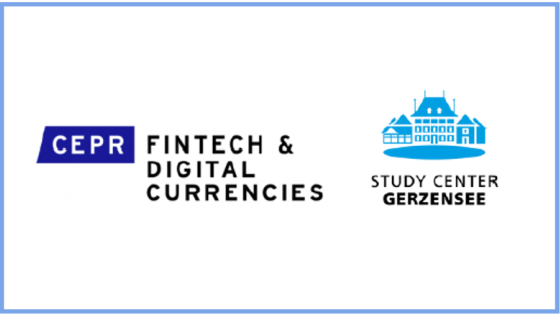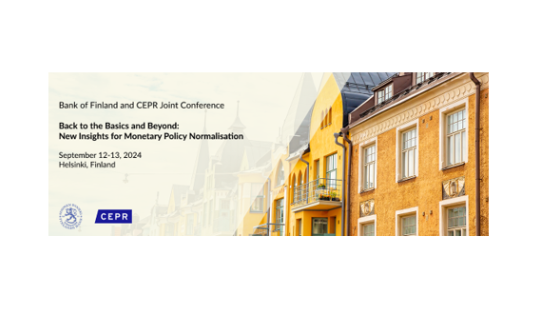
Effects, and Policy Implications
Francesco D’Acunto (Georgetown University)
and
Michael Weber (University of Chicago)
20-22 June 2022
Deadline: 6pm (GMT), Friday 27 May 2022
We are pleased to announce details of the latest EABCN Training School; a three-day course entitled “Subjective Inflation Expectations: Measurement, Effects, and Policy Implications”. Professors Francesco D’Acunto and Michael Weber will teach the course. It is primarily aimed at participants in the Euro Area Business Cycle Network but applications will also be considered from doctoral students, post-doctoral researchers, and economists working in central banks and government institutions outside of the network, as well as commercial organisations (fees are applicable for non-network non-academic organisations).
Tentative course description and outline:
Inflation expectations are central to the intertemporal consumption, saving, and investment choices of households and firms and determine the effectiveness of fiscal and monetary policy. Interest in the measurement and determinants of subjective expectations waned following the rational expectations revolution in macroeconomics. More recently, however, there has been growing attention to ways of eliciting and measuring the inflation expectations of consumers and firms. Research has documented deviations from full information rational expectations including upward biases and cross-sectional dispersion as well as the crucial role that grocery inflation and energy inflation—which are typically excluded from measures of core inflation used by policy makers to gauge future inflationary pressures---play in shaping the subjective inflation expectations of economic actors in the field. The current post-COVID-19 surge in inflation rates in European countries and the US places the need to measure and understand the dynamics and cross-section of subjective expectations at the center stage of policy measures that aim to anchor and manage inflation expectations in order to favour the stability of the business cycle.
To these aims, special emphasis will be devoted to understanding how central banks can use recently-studied communication-based policies, which include the choice of the policy message, medium, and sender in ways that can reach to the broader population of households and firms rather than just financial-market participants and hence directly manage effectively the beliefs and choices of a broader range of economic actors rather than relying on the indirect effect of monetary policy through financial intermediaries.
The following topics will be covered each day:
Day 1 – Monday, June 20, 2022
Topic: “Best Practices to Measure Subjective Inflation Expectations and Stylized Facts”
Morning lecture session from 09:00 AM - 12:00 NOON (CEST)
Afternoon practice session from 01:30PM - 3:30PM (CEST)
Day 2 – Tuesday, June 21, 2022
Topic: “What Determines Subjective Inflation Expectations and Economic Choices?”
Morning lecture session from 09:00 AM - 12:00 NOON (CEST)
Afternoon practice session from 01:30PM - 3:30PM (CEST)
Day 3 – Wednesday, June 22, 2022
Topic: “Managing Subjective Inflation Expectations and Economic Choices”
Morning lecture session from 09:00 AM - 12:00 NOON (CEST)
Afternoon practice session from 01:30PM - 3:30PM (CEST)
Required Readings:
D’Acunto, Francesco, Ulrike Malmendier, and Michael Weber: “What Do the Data Tell Us About Inflation Expectations?” Handbook of Subjective Expectations (forthcoming).
D’Acunto, Francesco, Olivier Coibion, Yuriy Gorodnichenko and Michael Weber: “Reality Check: How People Form Inflation Expectations and Why You Should Care.” Journal of Economic Perspectives (forthcoming).
D’Acunto, Francesco, Daniel Hoang, Maritta Paloviita and Michael Weber: “IQ, Expectations, and Choice.” Review of Economic Studies (forthcoming).
D’Acunto, Francesco, Ulrike Malmendier, Juan Ospina, and Michael Weber: :”Exposure to Grocery Prices and Inflation Expectations” Journal of Political Economy, 129(5), May 2021.
The first two papers provide the most recent research overview of the topics we will cover in the training session and contain detailed references to the growing literature on measuring inflation expectations, their determinants, and the relevance for economic choices, which participants can refer to for more detailed readings. The latter papers represent the backbones of the study of the deep determinants of subjective inflation expectations and subsequent economic choices for households and firms in terms of nature (cognition) and nurture (environmental economic signals).
Practice sessions:
On day 1, course participants will be provided with micro survey data to document salient and recurring properties of subjective inflation expectations and how they differ from the benchmark of full-information rational expectations.
On day 2, participants will develop and design their own survey questions to elicit subjective expectations, including dimensions that might be currently absent from the focus of this area of research, and are expected to prepare a short presentation on a possible research project.
On day 3, participants will present the question, methodology and design they aim to tackle and will receive feedback. Questions related to the characterization of subjective macroeconomic expectations as well as their management and potential impact of policy measures on expectations and choice are all especially welcome.
Administrative Information:
The course will take place online via Zoom. The course will run from Monday, June 20th to Wednesday, June 22nd. Each day the session will begin at 0900 (CET) and will run till 1530 (CET) with a break from 1200 – 1330 (CET). More information will be circulated to successful applicants closer to the date.
We ask that you send a current version of your CV. PhD students must also specify in which way the school will be useful for their current research (max 300 words).
The application deadline is 6 pm (GMT), Friday 27 May 2022.
Participants from non-academic institutions where the employer is not a member of the EABCN network are charged a course fee of EUR1000. We reserve the right to deny access to the course if payment has not been completed in due time.
How to Apply:
Candidates who are CEPR affiliated or already have a CEPR profile should apply by submitting their CV online:
1) Log in on the CEPR portal online at https://portal.cepr.org/
2) Go to https://portal.cepr.org/meetings/1572/info
3) If you are a member of the MEF programme area, click on "Change registration details", complete the requested information and click "Submit information".
4) If you have a CEPR profile, click on "Step 1: Apply" and complete the requested information and click "Register"
Candidates who are not CEPR affiliated or do not have a CEPR profile should apply by submitting their CV online:
1) Create an online profile here
2) Log in on the CEPR portal online at https://portal.cepr.org/
3) Go to https://portal.cepr.org/meetings/1572/info
4) Click on "Step 1: Apply" and complete the requested information and click "Register"
If you have any difficulty in applying please contact, Lydia Williams, CEPR Events Officer at [email protected] for assistance, with the subject line ‘1572 – EABCN Training School – D’Acunto and Weber, Online, June 2022’
About the Instructors:
Francesco D’Acunto will join Georgetown University as the James A. Clark Endowed Chair in Finance, Economics, and Public Policy in June 2022, after having served on the faculties of the University of Maryland and Boston College. His research interests include understanding the determinants of heterogeneous subjective beliefs and their implications for economic choices, as well as how private interventions (FinTech and robo-advising) as well as public interventions (unconventional fiscal and monetary policy) can manage such expectations. His work has been published in leading academic journals such as the Journal of Political Economy, the Review of Economic Studies, the Journal of Financial Economics, the Review of Financial Studies, the American Economic Journal, and Proceedings of the National Academy of Sciences (PNAS). Moreover, he has produced invited survey articles to shape the direction of research on the measurement and management of subjective economic beliefs across several fields, including economics (Journal of Economic Perspectives; AER P&P), finance (Palgrave Handbook of Technological Finance; Annual Reviews of Financial Economics), strategy and management (JEMS), and computer sciences and operations (Machine Learning in Finance: A Guide to Contemporary Practice).
D’Acunto earned a PhD and M.S. both from the Haas School of Business at the University of California, Berkeley. He also holds a three-year BA in Economics (with distinction) from La Sapienza—Universita’ di Roma and a two-year M.Sc. in Economics and Business Law (with distinction and dignita’ di stampa) from Tor Vergata University, which earned him a Raeli dissertation award.
Michael Weber joined Chicago Booth in 2014 as an Assistant Professor of Finance and was promoted to Associate Professor in 2018. He is also a faculty research fellow at the National Bureau of Economic Research in the Monetary Economics and Asset Pricing groups, a research affiliate at the CEPR in the Financial Economics and the Monetary Economics and Fluctuations research programmes, a member of the Macro Finance Society, and a research affiliate at the CESifo Research Network. His research interests include asset pricing, macroeconomics, international finance, and household finance. His work on downside risk in currency markets and other asset classes earned the 2013 AQR Insight Award. He has published in leading economics and finance journals such as the American Economic Review, the Review of Economic Studies, the Journal of Political Economy, the Review of Financial Studies, and the Journal of Financial Economics. Repec currently ranks him as top young economist with less than 10 years post first publication.
Weber earned a Ph.D. and an M.S. both in Finance from the Haas School of Business at the University of California, Berkeley. He also holds a Diplom in Business Economics (with distinction) from the University of Mannheim which earned him the SEW Eurodrive dissertation award.

